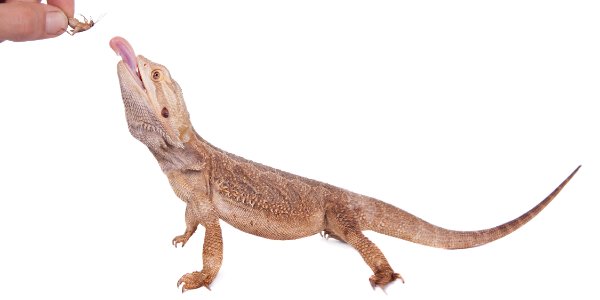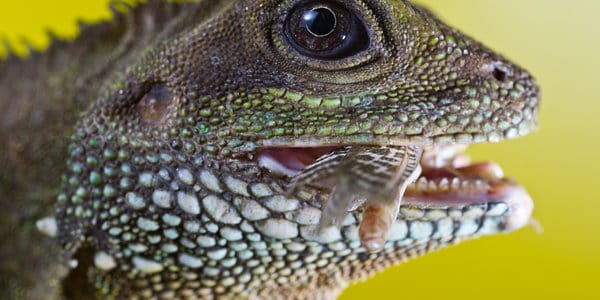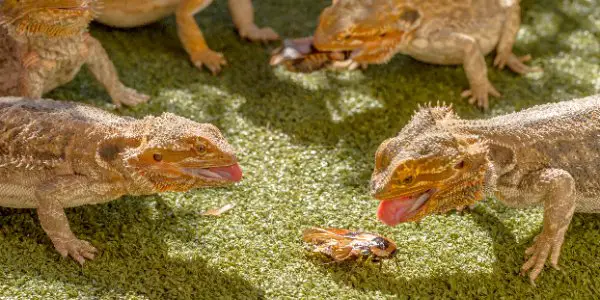
If it’s your first time to own a bearded dragon, especially a baby bearded dragon, figuring out how to feed them correctly as they grow can be overwhelming. From choosing the correct type of live feeder insects to determining the right type and proportions of plant vitamins and supplements, the entire process can be tiring.
Here’s what most first-time bearded dragon owners are asking: Can bearded dragons eat cockroaches? Yes, beardies can eat cockroaches. Insects such as cockroaches, earthworms, silkworms, superworms, and other roaches are rich sources of protein. Thus, they constitute a vital piece of bearded dragon diet particularly for baby and juvenile beardies that need plenty of body-building foods to support their rapid growth.
Besides, cockroaches are nutritionally balanced, thus form a healthy salad for beardies. Nevertheless, you should only feed the lizards with cockroaches that are specially bred and reared for consumption by pet reptiles.
Although bearded dragons can eat most cockroaches, wild roaches and those you find roaming households are often unfit for bearded dragon consumption. Apart from being unclean, they most likely lack the correct nutritional value to benefit your pet.
Therefore, commercial cockroaches sold in pet reptile stores are the best for feeding beardies. They’re specifically reared to feed pets, so they’re free of any hazards.
Alternatively, you can breed and harvest your own roaches if you have the means, prowess, and passion to handle those bugs.
Read on to learn the best type and amount of roaches to feed to bearded dragon pets. In addition, we’ll recommend a suitable feeding frequency to ensure your pet grows healthily from childhood through adulthood.
How Often Can Bearded Dragons Eat Dubia Roaches?
This is a hotly debated question in many bearded dragon forums. Since baby bearded dragons and juvenile bearded dragons are voracious eaters, they can potentially eat as many dubia roaches as they can hold.
At this stage, the beardies’ bodies grow quickly (a few inches each week), so they require an abundance of proteins to form new body tissue.
On the other hand, adult bearded dragons require more veggie and plant vitamins and less proteins as their bodies are already fully grown.
However, beardie specialists recommend suitable feeding amounts and frequencies to provide sufficient nourishment without exposing the reptiles to complications like overfeeding, chocking, impaction, and other digestive problems.
These recommended frequencies depend on multiple factors including:
- The bearded dragon’s age
- The size of the beardie
- The size of the feeder cockroach
- Generally, three-month old and younger baby bearded dragons should eat 10-20 roaches 3-5 times daily to satisfy a daily target of approximately 60 roaches.
- Between 4-6 months of age, bearded dragons can consume 10-15 roaches during each of the daily recommended 3-4 feeding intervals.
- For beardies aged 6-8 months, a diet of 10-15 roaches twice or thrice per day should supply sufficient proteins to support healthy growth.
- As the dragon nears 12 months of age, reduce the frequency of feeding roaches to twice a week and cap the amount at 10-15 roaches per interval.
Eventually, cut down on the roach uptake frequency and amount to around once to thrice and 10-20 respectively for 18-month old and older bearded dragons.
By this age, your beardie is most probably fully grown and would best profit from a diet of approximately 70% plant fodder, veggies, and fruits along with a sparing 30% of insect protein.
Remember to watch the size of the roaches you feed to the bearded dragon as the pet grows. Ideally, aim to feed dubia roaches to the bearded dragon that are smaller than the distance between their two primary eyes.
Moreover, ensure you supplement your bearded dragon’s diet with the recommended ratios of calcium, phosphorus, vitamins, and UVB light.
Along with ensuring efficient nutrient absorption, supplementation fosters strong bone development and helps the pet to evade potential dietary complications such as metabolic bone disease.
What Kind of Roaches Can a Bearded Dragon Eat?
We can all concur that roaches are a crucial component of a bearded dragons diet. They’re superior to most other insects for a variety of reasons such as:
- Rich protein source
- Delicious flavor that bearded dragons love
- Contain conveniently low and healthy fat levels
- Possess other valuable nutrients like calcium, vitamin A, and vitamin D
- Easy to digest as their bodies are soft
- Generally safer than other feeders which sometimes contain harmful parasites
- Easy to gut-load with valuable mineral and nutrient supplements
- Relatively easier and cheaper to purchase than most other bearded dragon insects feeder
- Have a relatively high meat to chitin (outer shell) ratio than most of their alternatives
In spite of their colorful perks, cockroaches are sometimes unavailable or not preferred for a variety of reasons. For instance, they’re:
- More expensive than most other popular feeder insects
- Scarce- cockroaches that are specially reared to feed bearded dragons are sometimes rare to find in pet stores. You might be forced to source them from online retailers or travel vast distances to obtain a sufficient amount for your reptile pet
- Challenging to handle as they sometimes bite
For these reasons, bearded dragon pet owners often turn to other insects as substitutes to cockroaches. In most instances, captive bearded dragons feed on these proteinous organisms:
- Dubia roaches
- Phoenix worms
- Crickets
- Earthworms
- mealworms
- Superworms
- Waxworms
- Locusts
- Butterworms
Can Bearded Dragons Eat Dead Cockroaches?
Naturally, bearded dragons hunt down and eat cockroaches and other feeder insects. Thus, they rarely partake of dead roaches unless they’re sick and unable to hunt or go for a long period without spotting live feeders.
In the same breath, you’re advised to always feed your bearded dragons with healthy, live, and freshly sourced cockroaches and other feeder insects.
Avoid dead insects as their carcasses could be hosts to numerous disease-causing microbes like bacteria and other parasites.

When Can Bearded Dragons Eat Roaches?
In their natural habitats, bearded dragons stalk and capture live roaches and other small insects such as locusts, earthworms, and crickets.
These organisms are not only easy to find in nature but also provide a stable source of proteins, fat, and other essential nutrients like calcium and minerals.
Along with this, bearded dragons eat a wide selection of plant materials such as fruits, leaves, and veggies to satisfy their vitamin requirements.
Possibly one of the biggest freedoms wild beardies enjoy is the ability to forage for roaches and other food components whenever the urge hits.
Like their wild counterparts, captive bearded dragons require a stable supply of both animal protein and plant vitamins for all-round healthy growth and development. Professionals recommend feeding the lizards with sufficient amounts and ratios of both foods at suitable frequencies to promote an overall healthy and cozy living.
However, domesticated beardies face one major challenge- they can’t forage for food in the wild. Thus, they rely solely on the owner to provide healthy and adequate nourishment for proper growth.
For this reason, captive bearded dragons should be offered a consistent supply of valuable supplements to ensure they thrive better than they would in the wild.
Can Dubia Roaches Fly?
No, Dubia roaches can’t fly. Moreover, they don’t produce irritating noises or climb smooth surfaces. For these reasons, along with their exceptional nutritional value, Dubia roaches for bearded dragons make the commonest and most preferred insect feeders for bearded dragons in captivity.
Will Dubia Roaches Bite Bearded Dragons?
Unfortunately, Dubia roaches have the potential to bite. In fact, they’re creepy bugs that sometimes bite bearded dragons and can even bite you!
Naturally, Dubia roaches only bite when they feel threatened by a perceived larger predator such as a bearded dragon or a human.
In most instances, Dubia roaches only bite captive bearded dragons when left alive and uneaten to roam the cage.
Possibly the worst thing about Dubia roach bites is that they can transmit potentially infectious microbes and illnesses to you and your bearded dragon. On top of this, Dubia roach bites result in pain, irritation, and discomfort.
How Many Dubia Roaches Should You Feed a Bearded Dragon?
The number of dubia roaches you should feed a bearded dragon is variable. It depends on multiple factors such as the age and size of the beardie along with the size of the dubia roach.
A general recommendation is to feed your dragon pet with a satisfactory amount of appropriately- sized (not larger than the distance between the beardie’s primary eyes) for each feeding interval.
Young bearded dragons are best served 25-60 2” dubia roaches across 3-5 feeding intervals every day until they reach for months.
Conversely, adult beardies between 8 and 18 months can comfortably enjoy a serving of 3” beardies approximately 3-10 every 2-3 days.
Oftentimes, amateur bearded dragon owners are tempted to let their bearded dragon friend enjoy as many dubia roaches as their tummy can hold.
Nevertheless, this shouldn’t happen because beardies can easily chock on excess or large roaches or experience other digestive complications like impaction.
Besides, surplus live dubia roaches that are left uneaten can bite you or your pet. Then again, they could die and degenerate the hygiene of your terrarium, often with appalling consequences like foul odors, contamination, and the possible death of your pet.
How Many Roaches Can Bearded Dragons Eat?
Depending on the age of the dragon, beardies can eat up to 4-5 dubias per day. The recommended size of the roach is about 2 inches.

Recap: Can Bearded Dragons Eat Cockroaches?
Absolutely! Bearded dragons in the wild and captivity enjoy eating cockroaches and other feeder insects for several reasons.
Cockroaches pack a punch of proteins, healthy fat levels, and other useful nutrients including vitamins and calcium.
Moreover, bearded dragon eats and find cockroaches tastier and easier to digest than most of their alternatives.
Nevertheless, beardies, especially captive ones, require specific portions of cockroaches and other insects along with vitamin-laden plan foods such as veggies and other green fodder.
Thus, bearded dragon owners are advised to tweak the amount, ratio, and frequency of the cockroaches they feed their pets in line with their pets’ age, size, and weigh to guarantee balanced nourishment.
Although bearded dragon cockroaches are plenty in the wild, ensure you only feed your dragon with live and specially-bred roaches.
You can obtain healthy and clean dubia roaches from reptile pet stores, online retailers, or breed your own.
Besides providing the recommended proportions of nourishment, such dubia roaches are also pathogen-free, thus safer for consumption.